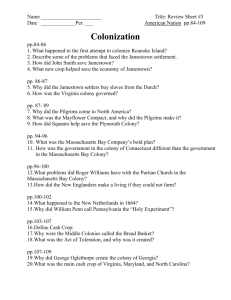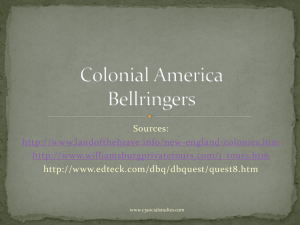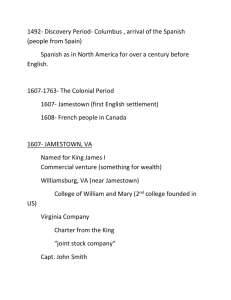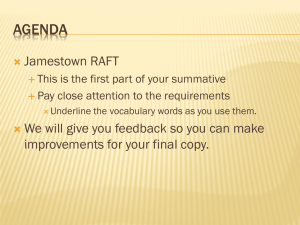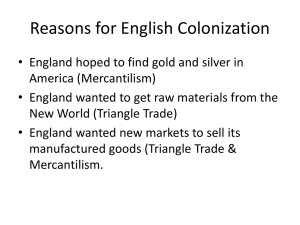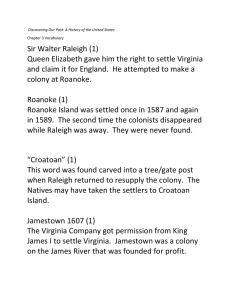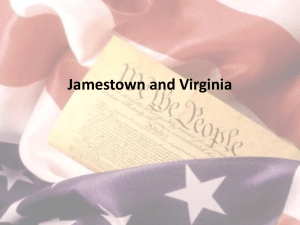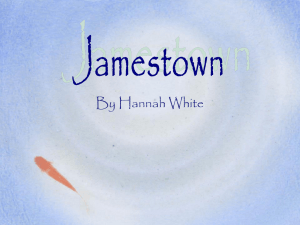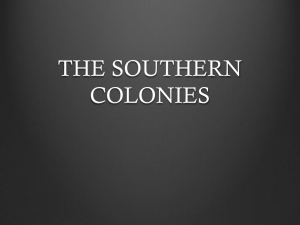US History Fort Burrows 3.4 Building the Jamestown Colony READ
advertisement
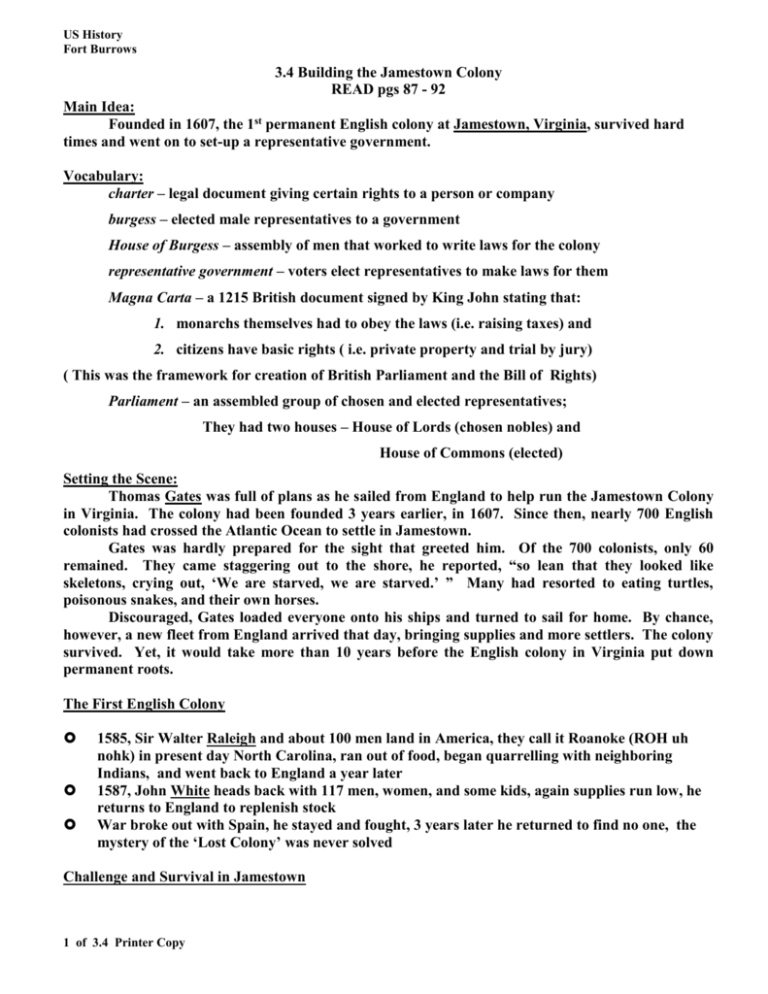
US History Fort Burrows 3.4 Building the Jamestown Colony READ pgs 87 - 92 Main Idea: Founded in 1607, the 1st permanent English colony at Jamestown, Virginia, survived hard times and went on to set-up a representative government. Vocabulary: charter – legal document giving certain rights to a person or company burgess – elected male representatives to a government House of Burgess – assembly of men that worked to write laws for the colony representative government – voters elect representatives to make laws for them Magna Carta – a 1215 British document signed by King John stating that: 1. monarchs themselves had to obey the laws (i.e. raising taxes) and 2. citizens have basic rights ( i.e. private property and trial by jury) ( This was the framework for creation of British Parliament and the Bill of Rights) Parliament – an assembled group of chosen and elected representatives; They had two houses – House of Lords (chosen nobles) and House of Commons (elected) Setting the Scene: Thomas Gates was full of plans as he sailed from England to help run the Jamestown Colony in Virginia. The colony had been founded 3 years earlier, in 1607. Since then, nearly 700 English colonists had crossed the Atlantic Ocean to settle in Jamestown. Gates was hardly prepared for the sight that greeted him. Of the 700 colonists, only 60 remained. They came staggering out to the shore, he reported, “so lean that they looked like skeletons, crying out, ‘We are starved, we are starved.’ ” Many had resorted to eating turtles, poisonous snakes, and their own horses. Discouraged, Gates loaded everyone onto his ships and turned to sail for home. By chance, however, a new fleet from England arrived that day, bringing supplies and more settlers. The colony survived. Yet, it would take more than 10 years before the English colony in Virginia put down permanent roots. The First English Colony 1585, Sir Walter Raleigh and about 100 men land in America, they call it Roanoke (ROH uh nohk) in present day North Carolina, ran out of food, began quarrelling with neighboring Indians, and went back to England a year later 1587, John White heads back with 117 men, women, and some kids, again supplies run low, he returns to England to replenish stock War broke out with Spain, he stayed and fought, 3 years later he returned to find no one, the mystery of the ‘Lost Colony’ was never solved Challenge and Survival in Jamestown 1 of 3.4 Printer Copy US History Fort Burrows 20 years later, King James I allowed the Virginia Company of London to try again. They received a charter for the lands between present-day North Carolina and the Potomac River. They also would be guaranteed the same rights as English citizens. A Disastrous Start Spring 1607, 105 colonist create Jamestown, Virginia, named after their king, on the James River in the Chesapeake Bay a swamp with unhealthy water and mosquito council of 13 men could not agree on the ‘future’ and the colony was near failure Starvation and Recovery Captain John Smith to the rescue he stated the obvious, ‘quit digging for gold and plant crops’ Powhatan (pow uh TAN), the most powerful Indian chief around agreed to give the settlers some corn for the winter white mans greed caused problems and fighting with the Indians colonist John Rolf married the chiefs’ daughter, Pocahontas (playful one), which allowed a brief period of peace new survival recipes including dog, cat, snake, toadstool, …YUM!!!! ¿¿ Summarize the challenges that settlers faced in Jamestown … __________________________________________________________________________ __________________________________________________________________________ __________________________________________________________________________ A Profitable Crop 1612, new miracle crop, TOBACCO, improves the colonies economy by 1620, England was importing 30,000 lbs of tobacco annually from the new colony *** List three problems the Jamestown Colony faced after 1607. 1. _______________________________________________________________________ 2. _______________________________________________________________________ 3. _______________________________________________________________________ Representative Government Reforms of 1619 elected representation comes to America; the privilege to elect burgesses and the assembly, House of Burgesses, began the creation of what we have today, representative government ( Government also known Legislature ) The 1st session passed a variety of laws. Their 1st Decrees: (this is a sample) that colonist plant mulberry trees and grape vines that penalties be imposed for drunkenness, idleness, and gambling that colonists must attend church twice on Sunday and that they bring their guns and swords with them that “no injury or oppression be committed by English against the Indians” that each town and plantation had to educate a number of Indian children 22 members met at the Jamestown Church on July 30, 1619. Parson Buck opened with a prayer, called roll, and they got down to law-making 2 of 3.4 Printer Copy US History Fort Burrows English Traditions 1215, English noblemen forced King John to create a ‘peoples’ voice, the Magna Carta, which led to our two house, bicameral, system we enjoy today only the wealthy men could actually vote, but their law-making was obeyed even by the monarchy Virginia’s Representative Tradition Virginians had more actual freedoms then their brothers back in England; they could vote even if they did not own land this changed in 1670, only free – white – male - landowners could now vote the idea that the people should have a voice in their government remained important and became known as their own ‘Great Charter’ ¿¿ How did the House of Burgesses contribute to the growth of representative government ? __________________________________________________________________________ __________________________________________________________________________ __________________________________________________________________________ New Arrivals Women in Virginia two women came to Virginia in 1608, a few more during the next 11 years, then in 1619, the Virginia Company sent 100 to the colony; the original mailorder bride – for 150 lbs of tobacco, you too could get a wife despite a death ratio of 2:1, by 1624, there were only about 300 female and 1,000 male in the Jamestown colony The First Africans we know that the 1st African slaves were brought to America by the French prior to 1619, records show about 32 African 1619, twenty more sold by the Dutch to the Virginians 1644, there was about 300 Africans; most were slaves, some were servants with hopes and dreams of becoming land-owners (some did) Anthony Johnson, free planter, owned 250 acres and employed 5 servants as slavery expanded, free Africans began to lose ‘rights’ by early 1700, free Africans could no longer ‘vote’ 1. What challenges did the 1st English colonies in North America face ? ______________________________________________________________________________________ ______________________________________________________________________________________ ______________________________________________________________________________________ 2. How did Virginia begin a tradition of representative government ? ______________________________________________________________________________________ ______________________________________________________________________________________ ______________________________________________________________________________________ 3. What group of people made up the new arrivals in Virginia after 1619 ? ______________________________________________________________________________________ ______________________________________________________________________________________ _____________________________________________________________________________ 3 of 3.4 Printer Copy

